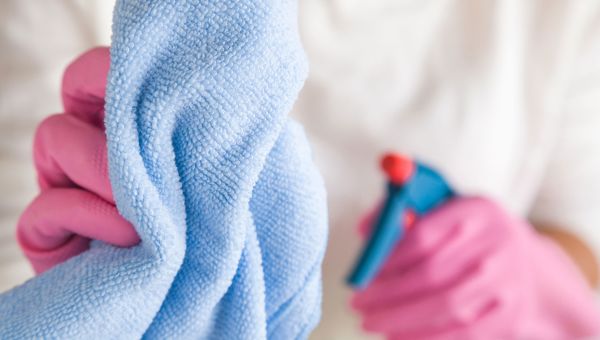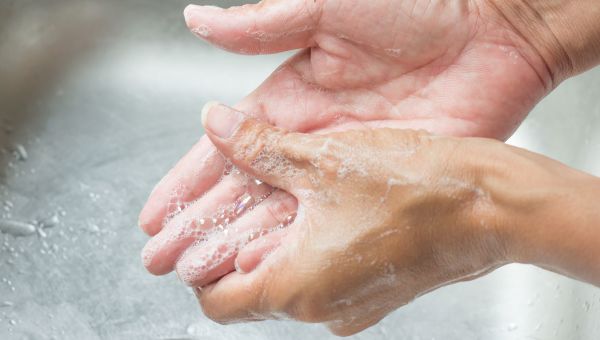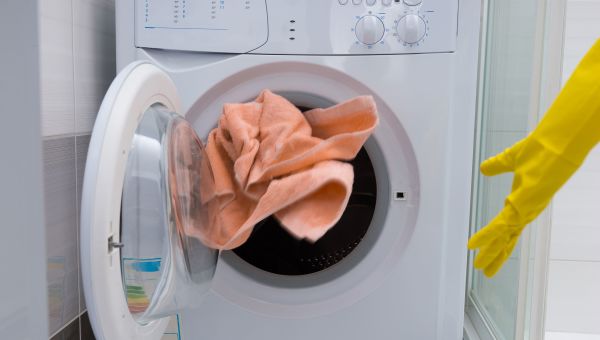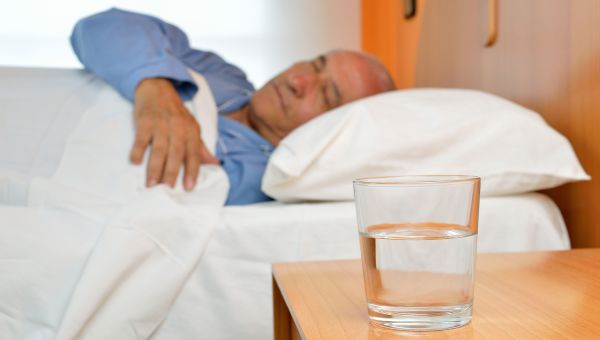5 ways you can catch norovirus
Having just 18 norovirus particles on your food can make you sick.
Updated on February 22, 2023

Norovirus, also known as the ''winter vomiting bug," is highly contagious. It can spread quickly through cruise ships, turning dream vacations into nightmares, or in other close quarters, such as schools, day care centers, and nursing homes. It can make you miserable for days—and there’s no vaccine.
Exposure to as few as 18 virus particles can make you sick, says William… Show More
Norovirus, also known as the ''winter vomiting bug," is highly contagious. It can spread quickly through cruise ships, turning dream vacations into nightmares, or in other close quarters, such as schools, day care centers, and nursing homes. It can make you miserable for days—and there’s no vaccine.
Exposure to as few as 18 virus particles can make you sick, says William Schaffner, MD, professor in both the department of health policy and the division of infectious diseases at Vanderbilt University in Nashville, Tennessee. The number of norovirus particles that could fit on the head of a pin would be enough to infect more than 1,000 people, according to the Centers for Disease Control and Prevention (CDC). Norovirus causes between 19 and 21 million cases of vomiting and diarrheal illness, called acute gastroenteritis, in the U.S. each year.
Since there are many different norovirus types, it can infect you more than once. Outbreaks in the United States are most common from November to April, though you can become ill at any time.
Show Less
Is it norovirus?
Norovirus is the main cause of food-related illness in the U.S. Symptoms of infection often come on suddenly, says Dr. Schaffner, often developing within 12 to 48 hours of exposure. Illness usually lasts anywhere from 24 to 72 hours.
Many cases of food poisoning are caused by food contaminated with… Show More
Norovirus is the main cause of food-related illness in the U.S. Symptoms of infection often come on suddenly, says Dr. Schaffner, often developing within 12 to 48 hours of exposure. Illness usually lasts anywhere from 24 to 72 hours.
Many cases of food poisoning are caused by food contaminated with the norovirus. But food poisoning can also be bacterial and stem from improper handling of food. Symptoms of both illnesses can be similar and may include upset stomach, cramps, nausea, vomiting, diarrhea, and fever.
To help avoid becoming sick with norovirus, it helps to learn the ways you can become infected.
Show Less

Contaminated foods
Billions of norovirus particles can be found in vomit and stool. You can become infected if stool from an infected person gets into your mouth. This can happen if they don’t practice good hygiene after using the toilet and touch food with dirty hands or hands that weren’t washed thoroughly.
Billions of norovirus particles can be found in vomit and stool. You can become infected if stool from an infected person gets into your mouth. This can happen if they don’t practice good hygiene after using the toilet and touch food with dirty hands or hands that weren’t washed thoroughly.
Any food served raw or handled by an infected person after it's cooked can become contaminated with norovirus. Other foods, such as oysters, fruits, and vegetables (raw or prepackaged) may be contaminated at their source.
To reduce your risk, wash your food before you eat it. Don’t eat food, such as salads, if you see they were touched with the bare hands of service workers, and don’t share utensils or food with someone who you think has norovirus. Wash fruits and vegetables thoroughly and cook oysters and other seafood to their suggested temperatures. Noroviruses are resilient. They can live even if temperatures get to 145 degrees Fahrenheit, so use enough heat to kill any germs.
Show Less
Person-to-person contact
Norovirus can also be spread via person-to-person contact, such as touching, Schaffner says. To reduce risk, avoid shaking hands. "Or stand back, bow, and smile," he suggests.
Stay far away from people who are ill, Schaffner adds. If children are sick, keep them out of areas where food is handled… Show More
Norovirus can also be spread via person-to-person contact, such as touching, Schaffner says. To reduce risk, avoid shaking hands. "Or stand back, bow, and smile," he suggests.
Stay far away from people who are ill, Schaffner adds. If children are sick, keep them out of areas where food is handled and prepared. Wash your hands with soap and water often, especially before eating or preparing food, after using the bathroom, and after changing diapers.
Show Less
Dirty surfaces
You can pick up enough virus particles from surfaces, such as countertops or bathroom faucets, to get sick with norovirus, says Schaffner. Norovirus can linger on surfaces and objects for days or weeks.
To reduce risk, cruise ship operators have become diligent about using disinfectants frequently… Show More
You can pick up enough virus particles from surfaces, such as countertops or bathroom faucets, to get sick with norovirus, says Schaffner. Norovirus can linger on surfaces and objects for days or weeks.
To reduce risk, cruise ship operators have become diligent about using disinfectants frequently to clean surfaces, Schaffner adds—and the rest of us should follow suit.
Put on rubber gloves and a mask before cleaning infected surfaces. Use a chlorine bleach solution made up of 5 tablespoons of household bleach per gallon of room temperature water. The virus is so tough it can survive even when surfaces are cleaned with some other commercial disinfectants.
Show Less
Another person’s vomit or stool
Direct contact with an infected person's vomit or stool—including from changing diapers—can also spread norovirus.
If surfaces are contaminated with vomit or stool from an infected person, wear gloves and clean and disinfect as soon as possible. Use the same chlorine bleach solution mentioned… Show More
Direct contact with an infected person's vomit or stool—including from changing diapers—can also spread norovirus.
If surfaces are contaminated with vomit or stool from an infected person, wear gloves and clean and disinfect as soon as possible. Use the same chlorine bleach solution mentioned earlier.
Washing your hands can reduce risk of transmission. Using warm or cold water, lather your hands with soap. Scrub for at least 20 seconds, rinse, and thoroughly dry with a clean towel. Hand sanitizers help, too, and can be used in addition to handwashing. Make sure you rub both sides of your hands and in between your nails, and use a brand that is at least 60 percent alcohol.
Show Less
Bedsheets and clothes
Bed linens and clothes contaminated with the vomit or stool of an infected person can spread norovirus, too.
To take care of the items, put on rubber or disposable gloves. Carefully launder them in hot water, using the maximum length of the washing cycle on your machine. Then, machine dry your… Show More
Bed linens and clothes contaminated with the vomit or stool of an infected person can spread norovirus, too.
To take care of the items, put on rubber or disposable gloves. Carefully launder them in hot water, using the maximum length of the washing cycle on your machine. Then, machine dry your linens and clothing.
Wash your hands thoroughly afterwards, especially if they came into contact with the linens and clothes.
Show Less
Can it be treated?
There's no specific medicine or treatment for norovirus infection. "A major concern is dehydration," Schaffner says. It's important to stay hydrated and replace lost fluids—so drink plenty of water.
If your dehydration is mild, sports drinks and other drinks without caffeine or alcohol can help,… Show More
There's no specific medicine or treatment for norovirus infection. "A major concern is dehydration," Schaffner says. It's important to stay hydrated and replace lost fluids—so drink plenty of water.
If your dehydration is mild, sports drinks and other drinks without caffeine or alcohol can help, according to the CDC. Another option: Buy an over-the-counter oral rehydration fluid. If your dehydration is severe, get medical help—you may need intravenous (IV) fluids. Some symptoms might include urinating less frequently, and having a dry mouth and throat, as well as feeling dizzy when you stand up. Children who are dehydrated may be very sleepy or fussy or may cry with few or no tears evident.
The infection can make you feel awful, but the good news is that it's usually short-lived. "You feel miserable for about three days and then you feel better,” says Schaffner. Even after you recover, however, the virus can stay in your stool for two weeks or more. Continue practicing good hygiene such as thorough hand washing. And don't prepare food for others for at least two days after your symptoms go away.
Show Less
Centers for Disease Control and Prevention. Norovirus. Page last reviewed May 4, 2022.
Lopman, B. Global Burden of Norovirus and Prospects for Vaccine Development. Centers for Disease Control and Prevention. August 2015.
William Schaffner, MD (professor of preventive medicine and professor of medicine) interview with the author, February 9, 2018.
Centers for Disease Control and Prevention. When Evacuation is a Must – Protect Yourself from Norovirus. February 18, 2021.
Centers for Disease Control and Prevention. Burden of Norovirus Illness in the U.S. Page last reviewed March 5, 2021.
Centers for Disease Control and Prevention. About Norovirus. Page last reviewed March 5, 2021.
Centers for Disease Control and Prevention. The Symptoms of Norovirus. Page last reviewed March 5, 2021.
Centers for Disease Control and Prevention. Food Poisoning Symptoms. Page last reviewed December 7, 2022.
Centers for Disease Control and Prevention. How Norovirus Spreads. Page last reviewed March 5, 2021.
Centers for Disease Control and Prevention. Preventing Norovirus. Page last reviewed November 28, 2022.
Centers for Disease Control and Prevention. Norovirus Illness: Key Facts. Page last updated January 2015.
Centers for Disease Control and Prevention. Cleaning and Disinfecting With Bleach. Page last reviewed October 31, 2022.
More On


video

article

slideshow


video


video
